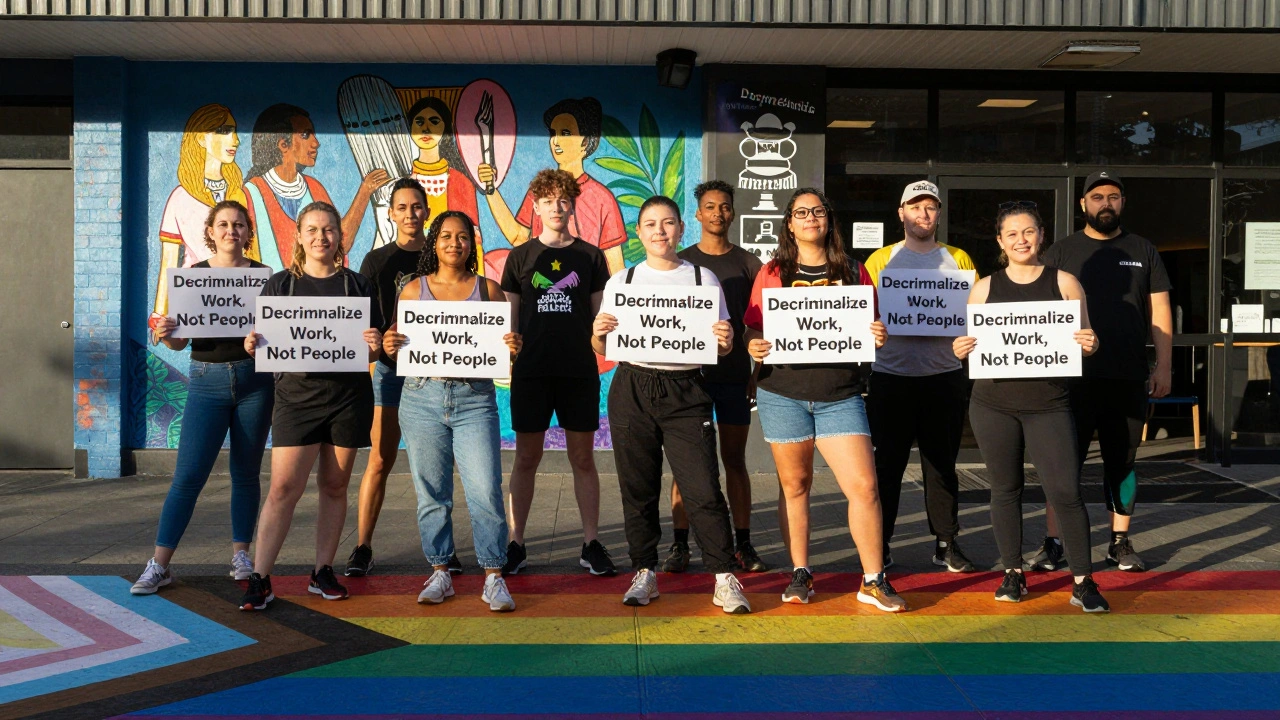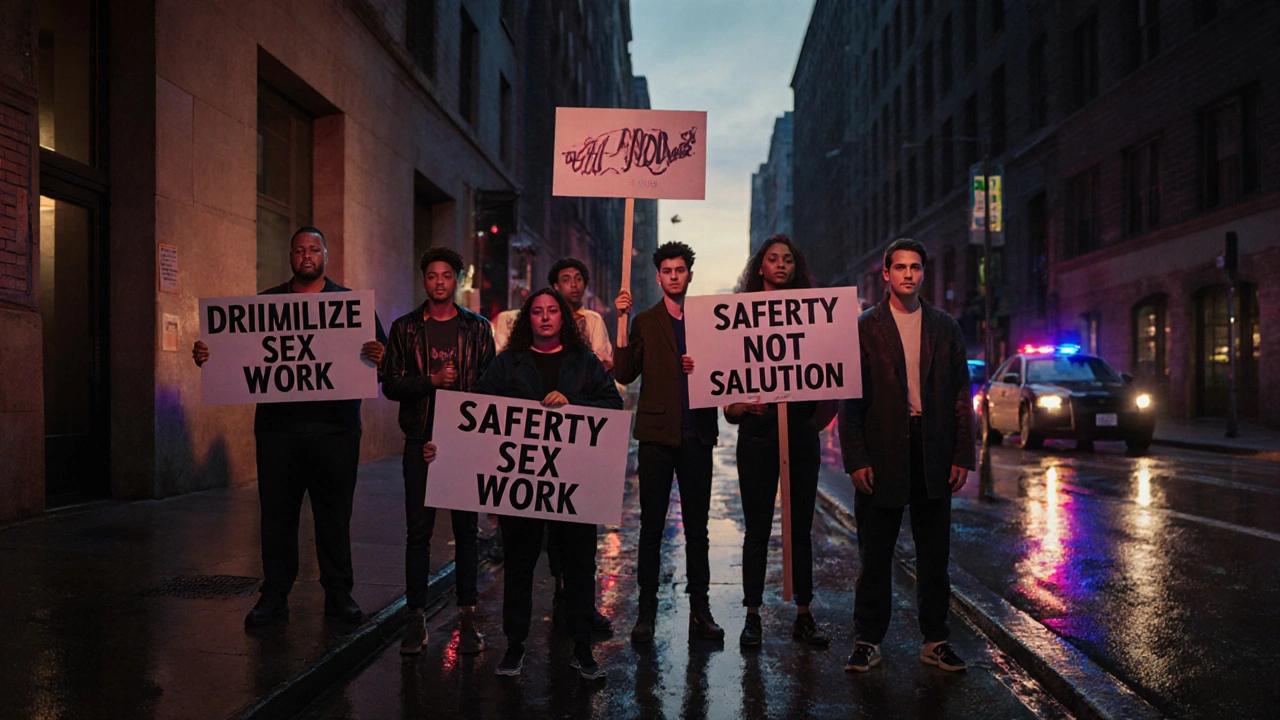Wondering if sex workers actually have legal protection? You’re not alone—it’s one of the most confusing questions in today’s world. Even in 2025, the legal lines are blurry, and what’s okay in one city could land someone in trouble just a few blocks away. That’s frustrating, especially if your safety and rights are at stake.
If you’re in the game, or you care about someone who is, skip the guesswork. Here’s what you really need to know: being a sex worker isn’t the same as being protected by law. Some places have new rules aiming to help, but others stick with old laws that do more harm than good. And yes, police and courts don’t always follow the script—even where protections exist.
It gets even trickier if you’re working online or using social media. That can open up new risks with tech laws or platforms shutting down accounts. Bottom line: don’t blindly trust what you hear online. Get your info from solid sources, and always know your local laws, because ‘legal’ changes with each zip code.
- Key Points and Quick Takeaways
- Are Sex Workers Protected by Law? Direct Answer
- Legal Realities: What Laws Actually Say
- Practical Rights and Barriers in Daily Life
- Staying Safe: Tips and Resources for Sex Workers
Key Points and Quick Takeaways
If you’re looking for the bottom line about sex work laws and legal protection, here’s the real deal. No sugarcoating, just the stuff that matters.
- Sex work laws vary a ton by country, state, and even city. Don’t assume what’s legal in one place is legal everywhere.
- Some places decriminalize sex work—meaning you technically can’t be arrested, but other laws (like zoning or public nuisance rules) still trip people up.
- In countries like New Zealand and parts of Australia, sex work is legal and regulated. Workers there have better access to legal protection and health care.
- In the US, only a few areas (like parts of Nevada) have legal brothels. Most of the country still criminalizes some or all sex work.
- Even when legal protection exists, lots of sex workers say they don’t feel safe reporting abuse or violence to police. Fear of arrest, shaming, or losing privacy is huge.
- Laws about online sex work are changing fast. Some content platforms have started banning or limiting accounts, often without warning.
Check out these quick stats to see what’s happening in 2025:
| Country/Region | Legal Status | Reported Safety Improvement |
|---|---|---|
| New Zealand | Decriminalized | 30% increase since 2017 |
| Parts of Nevada, USA | Legal (in brothels) | 15% increase since 2018 |
| United Kingdom | Legal to sell sex, but many activities around it are restricted | Flat—no major change |
Bottom line? Always double-check local rules before you work. Not sure where to start? Legal aid groups and sex worker-led organizations are your best resource. Don’t go by guesswork—get direct advice for your own situation.
Are Sex Workers Protected by Law? Direct Answer
This is the tough truth: In most places right now, sex workers do not have full legal protection. The laws are all over the map. In some countries, buying or selling sex is legal, but only under strict rules. In others, just talking about it online can get you into legal trouble.
Let’s break down the situation. In 2025, only a handful of countries like New Zealand, Germany, and the Netherlands treat sex work as a job with real protections. That means sex workers there can go to the police if something goes wrong, work safely indoors, and even pay taxes like everyone else. In most of the world, though, it’s not so simple.
If you look at the United States, for example, only a small area in Nevada allows legal brothels. Even there, strict rules apply. Everywhere else, sex work is at least partly illegal. You’ll find laws targeting buying, selling, or just advertising services. This makes it way harder for sex workers to report crimes or seek help, since they're worried about getting arrested themselves.
| Country/Region | Is Sex Work Legal? | Protection Level |
|---|---|---|
| New Zealand | Yes | High (full worker rights) |
| Germany | Yes (regulated) | Moderate-High |
| USA | Mostly No | Low (small exceptions) |
| United Kingdom | Partially | Low-Moderate |
This patchwork system creates big problems for safety and fairness. Even where laws are a bit looser, stigma and police harassment are still issues. And don’t be fooled by claims that "decriminalized" means "protected." Decriminalizing can mean fewer arrests, but it doesn’t always come with real rights or help.
Here’s what it boils down to: If you’re a sex worker, the law in your area decides everything. Some places are making progress, but for most, it's still risky. Always check your local laws, and reach out for advice from real sources or legal aid if you need to know where you stand.

Legal Realities: What Laws Actually Say
Here’s where things get real. When we talk about whether sex workers are protected by law, we’re looking at a huge maze. No two places treat sex work the same way, and the details matter—a lot.
In some countries, sex work is totally legal and regulated. Workers can get health checks, pay taxes, and even join unions. For example, in New Zealand, sex work has been decriminalized since 2003, letting workers call the police if they’re in danger without fearing prosecution. Germany regulates brothels and has licensing rules, but even there, making money on the street isn’t always legal.
Let’s look at the United States, where laws change from state to state. In Nevada, some counties allow licensed brothels, but everywhere else, even just offering sex for money is illegal. Some cities, like Seattle, have policies to avoid arresting sex workers and focus instead on safety or connecting people to services. But those are local exceptions, not the national rule.
| Country | Legal Status | Notes |
|---|---|---|
| New Zealand | Legal, regulated | Brothels licensed, health/safety laws apply |
| Germany | Legal, regulated | Street work has limits; must register with authorities |
| Sweden | Illegal to buy, legal to sell | Criminalizes buyers, not sellers |
| U.S. (most states) | Illegal | Some local programs offer alternatives to arrest |
Another layer? There’s a big difference between decriminalization and legalization. ‘Decriminalization’ means sex work itself isn’t a crime, so police don’t arrest workers for doing their job. ‘Legalization’ adds paperwork and rules—think background checks, business licenses, or zoning requirements. It can make things safer, but sometimes these hoops shut people out or drive workers underground again. No setup is perfect.
Here’s the tough truth: where sex work isn’t legal (which is still most places), sex worker rights are shaky. You may not be able to report abuse, demand fair pay, or take a client to court. Even where laws are better, bias can still creep in. Some police and judges don’t treat complaints from sex workers as seriously as complaints from others.
Bottom line? Your rights and risks depend on where you live, what kind of work you do, and how local cops or courts see you. Don’t guess—always check trusted sites or local advocacy groups for the latest info. Laws change, and staying updated is your best defense.
Practical Rights and Barriers in Daily Life
Ask any sex worker rights group what life’s like on the ground, and you’ll get a pretty clear answer: there’s a big difference between rights that look good on paper and what actually happens out in the world. Even when some sex work laws are supposed to protect, gaps and loopholes can leave people hanging.
Let’s talk basics. In cities where sex work is legal or partially decriminalized—think parts of Nevada or New Zealand—workers might get access to police protection, labor rights, or safer working spaces. But even there, not everyone feels totally safe talking to cops or coming forward if something bad happens. There’s a fear that reporting violence might lead to discrimination, getting outed, or even losing custody of a child. Most sex workers still worry about being treated fairly if things go sideways.
And then there’s the stuff nobody tells you about. Bank accounts can be shut down with zero warning, just because a bank thinks someone looks like they’re involved in adult work. Landlords have kicked out renters over rumors. Even getting medical care can be stressful—some health professionals don’t know how to talk to sex workers without judging or giving bad advice.
When it comes to staying safe on the job, there can be real roadblocks. Owning protection tools (like pepper spray or carrying condoms) is legal most places, but cops have used them as “evidence” of illegal activity in spots where sex work is criminalized. That means workers have to make tough choices: protect themselves, or avoid trouble with the law. Neither option feels fair.
- Legal help: Access depends on location. Some cities have hotlines and friendly lawyers; others don’t.
- Health services: Clinics that get sex work can be hard to find, but sexual health is a big deal. Some areas offer confidential, judgment-free checkups.
- Reporting crimes: In many places, cops are required to help. In practice, fear of arrest or social blowback keeps most workers quiet.
- Housing and banking: Losing a lease or bank account can happen on hearsay alone. Some places have started new “fair housing” or anti-discrimination laws to close the gap, but these are still rare.
- Online work: Social media platforms and payment apps often ban adult content—even if it’s legal locally. Getting booted from platforms can suddenly wipe out income.
To get a sense of how often these issues hit sex workers, check out this recent 2024 survey:
| Barrier Faced | Reported by (%) |
|---|---|
| Banking/account access denied | 48 |
| Fear of reporting crimes | 76 |
| Discrimination by health staff | 52 |
| Eviction or housing threat | 37 |
You can see the uphill battle isn’t just about laws—it’s about how those laws play out in real life. So if you’re looking for safe ground, it’s smart to connect with local advocacy groups. They know the local climate, have tips for dodging the worst headaches, and can connect you to lawyers and clinics that treat you like a human being—not just a headline.

Staying Safe: Tips and Resources for Sex Workers
If you’re in sex work, safety is always top priority. Laws are confusing, and while some places offer real sex worker rights, risks remain everywhere. Street work, online platforms, or private appointments—all of them come with different dangers. Here’s a guide to keeping yourself a bit safer, with resources trusted by real people in the industry.
- Know Your Legal Rights: Always check the current laws in your area. For up-to-date info, sites like Sex Workers Outreach Project (SWOP) or Decriminalize Sex Work post legal guides and news by city and state. Carry a copy of your rights when you work, especially if you’re concerned about police stops.
- Secure Communication: Use encrypted apps like Signal for texts and calls. Don’t share your real name or address with new clients. Burner phones or private virtual numbers give extra privacy.
- Screen Every Client: Don’t skip screening. Ask for references, check ID, and use blacklist or bad client warning sites like UglyMugs or Switter. If something feels off, trust your gut and pass on the booking.
- Keep Emergency Contacts Ready: Save someone you trust as an emergency alert contact. Some apps, like SafeCall or the Red Umbrella Alert tool, let you check in before and after dates—just in case. Share your location with a trusted friend for extra safety.
- Handle Money Safely: Use cash or encrypted payment apps instead of bank transfers, which might get flagged. Never agree to delayed payments—scammers love that trick.
Just to paint the picture, here’s how sex workers rated top safety tools in 2024 in an anonymous survey:
| Tool/Resource | Useful for | % Who Recommend |
|---|---|---|
| Signal | Private texting/calls | 87% |
| UglyMugs | Client warnings | 80% |
| SafeCall | Check-ins | 75% |
| SWOP-USA Legal Aid | Legal info/support | 78% |
Sex worker safety also means looking after your mental health. SWOP and the National Harm Reduction Coalition offer crisis support and peer chat lines. Don’t keep things to yourself—there’s support out there, and you’re not alone.






